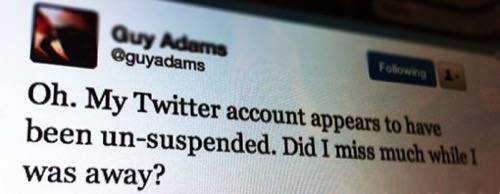
The weekend’s fire storm over NBC’s handling of its Olympics broadcast had barely died down yesterday when online critics found a new target: Twitter. In response to a complaint from NBC, the microblogging service suspended the account of Guy Adams, a reporter who tweeted a harshly critical comment about NBC’s Olympics coverage.
Adams was one of countless Twitter users who voiced criticism over NBC’s handling of the Summer Olympics. The broadcaster delayed transmission of some events in the U.S., not anticipating blowback from the real-time Web. Adams took his criticism one notch higher on Friday, July 27, by tweeting the business email address of NBC executive Gary Zenkel. On Sunday, Twitter revoked his account, claiming that tweeting Zenkel’s email address violated of its terms of service. Twitter reactivated Adams’ acccount earlier today and took the rare step of addressing the incident directly, apologizing for mishandling it. But the damage has been done. Twitter, normally considered a champion of free speech, was widely lambasted for favoring a corporate partner over a user’s right to express himself freely.
Twitter’s policies forbid users from sharing personal information about others, such as a home address or Social Security number. Included on the list of verboten details is a person’s private email address, but it doesn’t specifically mention business email addresses. As Adams pointed out, such addresses are readily accessible via a quick Google search.
Twitter’s actions sparked immediate complaints, especially in light of the company’s partnership with NBC. As it has done with other broadcasters during major television events, Twitter teamed up with the network to highlight tweets from Olympic athletes, anchors and fans alike. While no money changed hands due to the partnership, Twitter users charged the service with censoring Adams.
Censorship or Not, This Looks Bad For Twitter and NBC
Whether it’s censorship or not, the whole affair has made the ongoing #NBCfail debacle look even uglier. And, of course, far more people now know Mr. Zenkel’s email address than would have if Twitter had left Adams’ account alone. Meanwhile, Adams has a much bigger audience, which extends beyond his rapidly-climbing number of Twitter followers and now includes major media outlets around the world. If NBC intended to silence Adams, it did about as good of a job at that as it did nailing down its disastrous social media strategy for the Olympics in the first place.
The subject of free speech on Twitter is a rather sensitive one in light of how the service is sometimes used by global activist movements and journalists around the world. Adams’ suspension was temporary, but it begs the question of exactly where Twitter draws the line. If political activists post the email addresses or phone numbers of elected officials, will they be kicked off Twitter, too? Or does Twitter regard politicians as public figures with no expectation of privacy? If so, why not high-ranking executives at huge companies?
Twitter is normally quite accommodating when it comes to matters of free speech and tends to stand up for its users even in the face of government inquiries for their data. While the company claimed to be acting in accordance with its own policies in this case, it’s hard for many to swallow the idea that NBC wasn’t given preferential treatment because of the relationship between the two companies. The short-term PR flub may technically be over, but major questions remain about Twitter’s definition of and commitment to free speech.
















